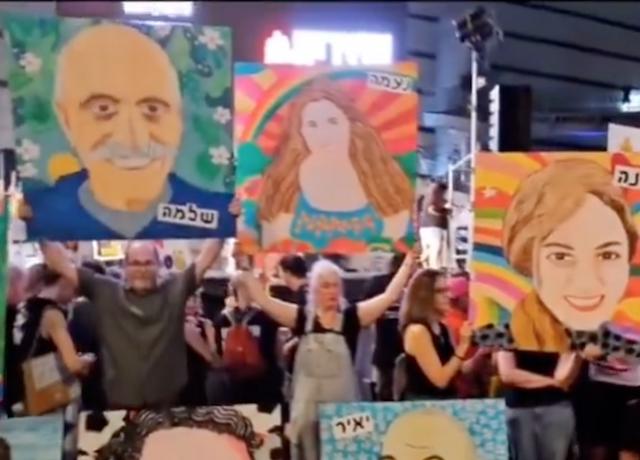In a stark display of disconnect from the harsh realities of the situation, the family of Israeli hostage Matan Angrest publicly urged Prime Minister Benjamin Netanyahu to sign a hostage deal with Hamas. This plea, however, ignores the crucial detail that Israel has consistently shown a willingness to accept such deals, only for Hamas to reject them time and again. The focus on Netanyahu’s signature is thus misplaced; the real barrier to progress lies with Hamas, which has persistently blocked the path to a potential agreement.
At a large protest in Tel Aviv on Saturday evening, Matan Angrest's mother, Anat, played a harrowing audio clip of her son, which marked the first sign of life from him since he was abducted from the Nahal Oz military base on October 7. In the audio, Angrest addressed Netanyahu directly, using language that strongly suggests coercion by his captors. He referred to himself and his fellow hostages as “prisoners,” echoing Hamas’s terminology—a clear indication of the psychological manipulation at play. Angrest’s message implored Netanyahu to facilitate an exchange between Palestinian prisoners in Israel and the hostages in Gaza, expressing a desperate desire to see his family again. This poignant plea underscores the unimaginable pressure hostages and their families are under, but also highlights the twisted narrative being spun by Hamas.
🚨BREAKING NEWS : First sign of life from captivity: Matan Angrest in his voice: "I want to see my family". 🎗️💔 pic.twitter.com/izyqdP2fbU
— Eli Afriat 🇮🇱🎗 (@EliAfriatISR) September 14, 2024
Despite these emotionally charged calls, it’s important to note that Israel, under Netanyahu’s leadership, has already agreed to the release of some of the most dangerous terrorists held in Israeli prisons, including speculation around the inclusion of Marwan Barghouti, a notorious figure linked to multiple murders during the second intifada. Yet, even with these significant concessions on the table, Hamas remains unyielding. The narrative pushed by protesters, therefore, appears disconnected from the reality of ongoing negotiations and the intransigence of Hamas.
The rally, part of a broader series of protests that have been a near-weekly occurrence since the October 7 attacks, was a politically charged event. These protests are organized by the same groups that previously demonstrated against the Netanyahu government, raising questions about the true motivations behind the current mobilization. Figures such as former Prime Minister Ehud Barak, who has a long-standing political rivalry with Netanyahu, are seen as key drivers behind the scenes, leveraging the emotive issue of hostages to exert pressure on the current coalition.
Former Israeli Prime Minister Ehud Barak voiced his frustrations at Prime Minister Benjamin Netanyahu’s speech after six Israeli captives were found dead in Gaza on Sunday. Barak said Netanyahu’s comments are “a hollow spin” to make sure that the “war is not going to end”. pic.twitter.com/0VUwPHdRUj
— Middle East Eye (@MiddleEastEye) September 3, 2024
Anat Angrest's address was followed by a heartbreaking recount of her conversations with her other children, highlighting the unbearable uncertainty they live with daily. She questioned Netanyahu’s ability to answer her children’s most pressing fears: whether their brother Matan is eating, whether he will ever come back, and what role figures like far-right ministers Itamar Ben Gvir and Bezalel Smotrich play in the government’s stance on a hostage deal. Angrest directly blamed these “crazies,” as she termed them, for her son’s continued captivity, reflecting a palpable frustration with the Israeli leadership rather than the true orchestrators of her son’s plight—Hamas.
Adding to the criticism was Einav Zangauker, another mother of a hostage, who took to the stage to accuse Netanyahu of being the one effectively holding her son. She reiterated her belief that Israel’s current political climate, as allegedly described to her by Mossad head David Barnea, offers no hope for a deal—a claim Barnea has denied. However, other defense officials have echoed similar sentiments, with IDF Chief of Staff Lt. Gen. Herzi Halevi reportedly expressing doubts about the prospects of any successful negotiations given the current situation.
Today, same Ehud Barak spends all his time agitating for abolishing of the government of Israel, calling on reservists to not report for military service!
— marian schneps (@smarian88) September 9, 2024
😜😱🤮👎🏿
All in the effort to undermine Netanyahu’s government, treason! https://t.co/yKofntAh06
The protests calling for a hostage release deal have intensified since the brutal October 7 Hamas attack that saw over 1,200 Israelis killed and 251 taken hostage. As the weeks drag on and more tragic discoveries are made—like the recent recovery of six murdered hostages from a tunnel in southern Gaza—the urgency and emotional intensity of these protests have only grown. The merging of anti-government demonstrations with hostage deal rallies underscores a broader dissatisfaction with Netanyahu’s leadership, as well as a complex interplay of political maneuvering and genuine public outcry.
"Voice recording of soldier Matan Angrest, who was released from Gaza captivity: 'Netanyahu, I trust you!'
— Rachel Rosenberg (@rachelhalinasor) September 14, 2024
The audio of this video was first made public by his mother, Anat Angrest, during the weekly protest."🇮🇱✡️🎗️🙏 pic.twitter.com/NKdx57X389
Ultimately, the true obstacle to a hostage deal is not Netanyahu’s signature or the Israeli government’s stance, but Hamas’s steadfast refusal to engage in genuine negotiations. The protests, while a powerful expression of public sentiment, risk overshadowing this critical reality. As families continue to suffer and calls for action grow louder, the focus must remain squarely on the real issue: Hamas’s intransigence and its brutal exploitation of human lives as bargaining chips in a cynical and callous game of power.


